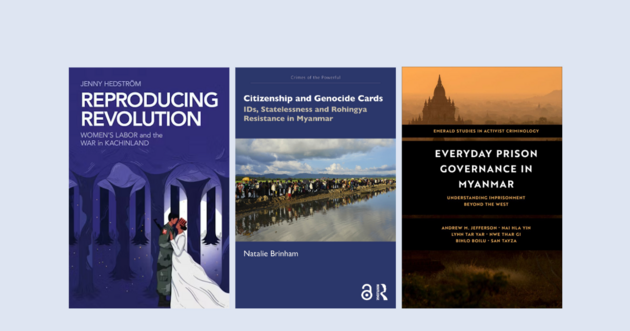May
Meet the authors: New Books on Myanmar I

Book panel with Jenny Hedström, Natalie Brinham and Andrew Jefferson
In Reproducing Revolution, Jenny Hedström explores the Kachin revolution in Myanmar from the perspective of female soldiers, female activists, and women displaced by the violence in northern Myanmar. Hedström argues that the household is an inherently gendered, militarized, and political space that impacts, and is in turn impacted by, the external conflict with which it coexists. In this context, women's everyday labor—the gendered work of childcare, farming, fighting, and forging connections both across households and between the household and the army and the nation—is key to revolutionary survival. Hedström calls this labor militarized social reproduction, and in Reproducing Revolution she demonstrates that such labor is critical to the military effort, and that warfare itself is shaped through everyday domestic action.
About the author: Jenny Hedström is Associate Professor of War Studies at Swedish Defence University. She is coeditor of Waves of Upheaval in Myanmar. Her research and teaching concern the relationship between households, gender, warfare, and peacebuilding—often with a focus on Myanmar
Citizenship and Genocide Cards: IDs, Statelessness, and Rohingya Resistance This book draws on Rohingya oral histories and narratives about Myanmar’s genocide and ID schemes to critique prevailing international approaches to legal identities and statelessness. By centring the narratives of survivors of state crimes, collected in the aftermath of the 2017 genocidal violence, this book examines the multiple uses of state-issued ID cards and registration documents in producing statelessness and facilitating genocide. In doing so, it challenges some of the international solutions put forward to resolve statelessness.
Rohingya narratives disrupt a simple linear understanding of documenting legal identity that marginalises experiences of these processes. The richly layered accounts of the effects of citizenship laws and registration processes on the lives of Rohingya problematise the ways in which international actors have endorsed state ID schemes and by-passed state-led persecution of the group. This book will be valuable for scholars studying global criminology, state crime, development studies, refugee and migration studies, statelessness and nationality, citizenship studies, and genocide studies.
The Open Access version of this book, available at www.taylorfrancis.com, has been made available under a Creative Commons Attribution (CC-BY) 4.0 license
About the author: Natalie Brinham is a Leverhulme Early Career Fellow at the University of Bristol. Her current research explores citizenship stripping and resistance in conflict situations, including considering the impact and potential of digital ID systems to counter statelessness. Her research interests also include state crime, genocide, forced migration, and bordering technologies.
Everyday Prison Governance in Myanmar analyses prison life in Myanmar during a short-lived period of democratic transition. The accounts of former prisoners reveal the realities of everyday life illuminating survival strategies, landscapes of emotion, and power dynamics. Making a significantly different kind of contribution, this is the first in depth, empirically based, systematic study of imprisonment practices in Myanmar between 2015-2020, a period believed by many to herald a new democratic dawn for Myanmar before the subsequent military coup. Based on rich data gathered across four sites and examined collaboratively by a team comprised of experienced prison scholars and a local research team, the authors do not simply document the dynamics of prison governance; they analyse and contextualise them, utilising a bottom-up perspective informed by the most recent scholarly trends on prison governance in the Global South. Filling an important gap in the scholarship about prisons in South East Asia and expanding the scope of the field of prison studies ‘beyond the west’, the authors provide important counterpoints to dominant understandings of imprisonment based on Western sources.
About the author: Andrew M. Jefferson is a senior researcher at DIGNITY – Danish Institute Against Torture, where for the past two decades he has conducted ethnographic research on prisons and prison reform in non-western contexts. Current work focuses on thinking through ways to inhibit the practice of torture that draw on intellectual traditions associated with prison abolitionism, as well as considering ways to strengthen links between civil society activism and the academy to negate the harmful effects of repression and state power. Co-authors are Myanmar-based researchers protected by pseudonyms. They were core members of the research team, and they continue to engage in work that promotes justice in Myanmar.

About the event:
Location: Asia Library, Centre for East and South-East Asian Studies, Sölvegatan 18 B, Lund
Contact: elizabeth.rhoadsace.luse
